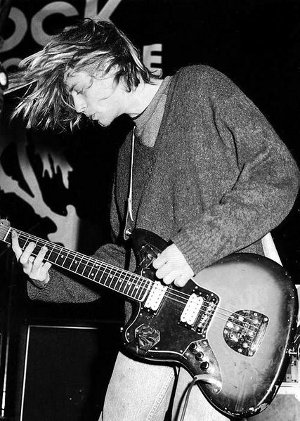Four Guitarists Who Changed Music Forever
Duane Allman, Stevie Ray Vaughn, Eric Clapton, Yngwie Malmsteen, Eddie Van Halen, Jimmy Page, Randy Rhoads, Steve Vai, Jeff Beck, Joe Satriani, the list of fretboard wizards is a long and ingenious one. When considering the many guitarists who have elevated music, fundamentally changed it, I chose to go with the following four, in no particular ranking, but for very particular reasons. Their contributions are immeasurable, indisputable, and in one case, highly controversial.
Chuck Berry

You may scoff to see Kurt Cobain's name on a list of guitarists of such high regard. Some of you—okay, many of you—will no doubt be up in arms at his inclusion. After all, and by his own admission, Cobain could barely even play the guitar! His musicianship was coarse, primitive even. Cobain is, in fact, considered to be one of rock guitar’s antiheroes. So why mention him in the same breath as someone with the mastery of Jimi Hendrix? One word: Nevermind.
The arrival of Nirvana on the music scene with their sophomore effort marked a seismic shift in the history of popular music, much like the emergence of Elvis and the Beatles. Nevermind, with its monster single "Smells Like Teen Spirit" and songs like "Come as You Are," "Lithium," and "In Bloom," exploded when it dropped in September 1991 and laid waste to everything that came before. Suddenly the pretense of glamour, the theatricality and extravagant shredding that defined the pop or "hair" metal bands of the late 1980s, seemed dated and irrelevant. The minimalist aesthetic of grunge had taken over the mainstream. While other alternative bands had had hits before, Nirvana kicked open the door for a host of alt acts like Alice in Chains, Pearl Jam, and Soundgarden to follow.
As the band's main songwriter, Kurt Cobain often looked to his childhood for inspiration. Born on February 20, 1967, in Aberdeen, Washington, Kurt said he was happy enough as a young boy right up until his parents divorced when he was 7, an event that resonated throughout the remainder of his life and fueled a lot of the anguish in Nirvana's music. With the disintegration of his family, Cobain felt isolated and became withdrawn and anti-social. He spent much of his time painting, singing, and listening to the Beatles and the Monkees, eventually moving onto bands like Led Zeppelin, Kiss, Black Sabbath, the Sex Pistols, and the Clash. For his 14th birthday, Kurt's uncle gave him the option of a bicycle or a guitar as a gift; he chose the latter. Although the instrument was fairly beat up, it inspired Kurt to learn to play. He began experimenting with different musical styles, trying to create his own, and gravitated toward the Seattle underground where he (and future Nirvana bassist Krist Novoselic) roadied for a band called the Melvins. Kurt dropped out of high school a few weeks shy of graduation and left Aberdeen for Olympia, where he and Novoselic formed Nirvana in 1986.
The unassuming Cobain, with his passion for junk shop guitars and disdain for the sonic and visual excesses of glam, would become the poster boy for an entire movement. He wrote songs that were crafted from chord sequences based mainly around power chords and that combined pop hooks with dissonant guitar rhythms and shifts in dynamics, from quiet verses to loud choruses. He took an anti-musician stance and intentionally sought to break away from traditional structures with his sloppy, almost haphazard, everyman approach to making music that knocked rock off its pedestal and closed the gap between artist and audience.
Nirvana received several awards and nominations in their debut year in 1992, including nods for Favorite New Heavy Metal/Hard Rock Artist from the American Music Awards, Best Alternative Music Performance for Nevermind from the Grammy Awards, and Video of the Year and Viewer's Choice for "Smells Like Teen Spirit" from the MTV Video Music Awards. They won a Grammy in 1996 for Best Alternative Music Performance for their posthumous release, MTV Unplugged in New York. "Through Kurt I saw the beauty of minimalism and the importance of music that's stripped down," says Nirvana drummer Dave Grohl. In his Grammy Award acceptance speech earlier this year for Best Rock Performance by the Foo Fighters, Grohl reminded the audience that making music, that playing an instrument, is not about being perfect or sounding absolutely correct. "It's the human element that's important," he said. In a world overrun with technology, his simple message made headlines.
Okay. You've read my choices for four guitarists who have changed music forever, now let me hear yours. Which guitarists do you think deserve to be on this list and why?
images:
jimi By A. Vente (Beeld en Geluidwiki - Gallery: Hoepla) [CC-BY-SA-3.0-nl (http://creativecommons.org/licenses/by-sa/3.0/nl/deed.en)], via Wikimedia Commons
kurt - By KurtCobain4ever (Own work) [CC-BY-SA-3.0 (http://creativecommons.org/licenses/by-sa/3.0)], via Wikimedia Commons
chuck - By Universal Attractions (management) (eBay item photo front photo back) [Public domain], via Wikimedia Commons
robert - By flirck [CC-BY-2.0 (http://creativecommons.org/licenses/by/2.0)], via Wikimedia Commons